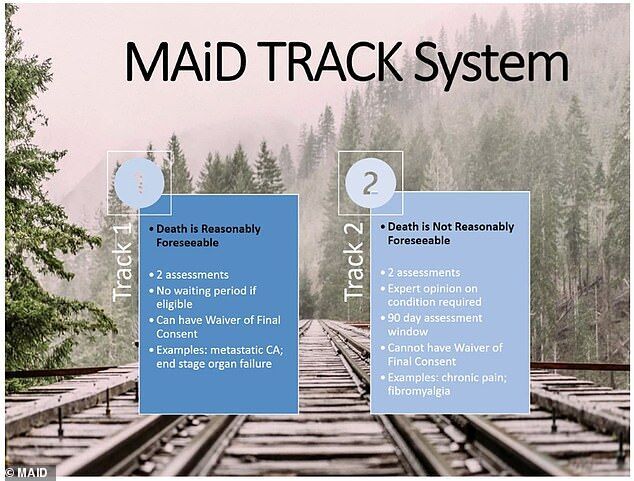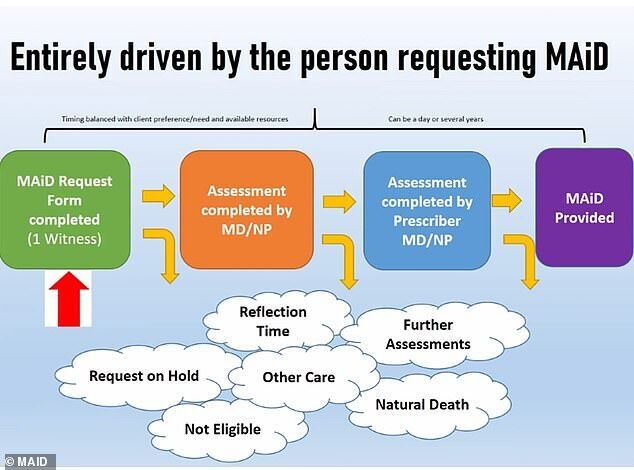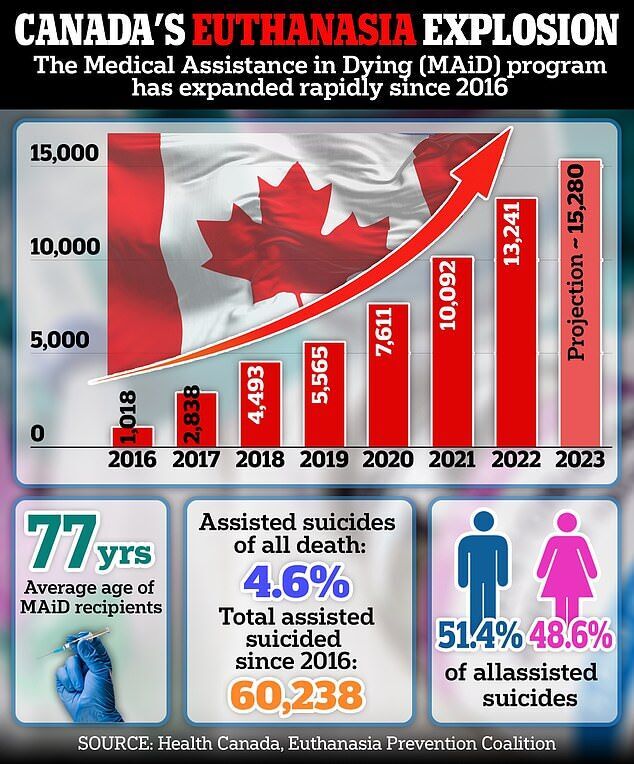Canadian doctors reveal regret over euthanizing patients who were simply obese or poor
© Health Canada, Euthanasia Prevention Coalition
Canada’s doctors are raising grave concerns about a rising trend in euthanizing people who are not terminally ill.
Newly-unearthed communications reveal many physicians charged with carrying out assisted dying have found the loosening of criteria ‘morally distressing.’
In 2021, Canada expanded its medical dying law to include people with incurable - but not terminal - illnesses, which led to a 30 percent increase in assisted deaths in 2022.
A doctor in Ontario wrote in his patient’s report that while the man had a severe lung disease, what drove him to euthanasia was ‘mostly because he is homeless, in debt and cannot tolerate the idea of (long-term care) of any kind.’
In another case, a doctor expressed their conflict at providing euthanasia to a patient simply because she was obese and depressed. Meanwhile, an elderly woman wanted to die because she was struggling with the grief of losing her husband.
An Associated Press investigation that involved obtaining internal data from the provincial government in Ontario revealed dozens of online posts by doctors on public forums.
Doctors provided the AP with messages shared on the private forums for assisted dying specialists on the condition of anonymity. The messages came from doctors who both performed euthanasia and assessed people who requested it. Many said they were uncomfortable with ending the lives of non-medically vulnerable people.
Others felt conflicted about providing euthanasia to people not suffering from terminal illnesses, but those experiencing grief or being obese.
One Ontario doctor who spoke with the AP revealed that their patient had severe obesity and depression, saying she felt like a ‘useless body taking up space.’
She had withdrawn from activities and social life and said she had ‘no purpose,’ according to the doctor who reviewed her case. While she was not actively dying, doctors said euthanasia was warranted because obesity is ‘a medical condition which is indeed grievous and irremediable.’
Meanwhile, a woman in her 80s petitioned for assisted death after losing her husband, sibling, and cat in a six-week period, according to AP reporting.
On top of that, she was on dialysis, an exhausting tri-weekly procedure that has someone hooked up to a blood-filtering machine for about four hours at a time.
But the official who reviewed her request said it had nothing to do with a medical condition - but rather it was because of her grief. Because she had lost her support system, doctors said her suffering was permanent and thus approved her request.
Canada is on track to break euthanasia records once again with 15,280 doctor-assisted suicide deaths in 2023 — a 15 percent jump on the previous year, a campaign group warns.
Alex Schadenberg, director of the Euthanasia Prevention Coalition, says ever-more people are approved for euthanasia even when they suffer from nothing more than ‘frailty’ and other seemingly benign conditions.
About 60,238 people have died from MAiD since the program was launched in 2016.
As part of its investigation, the AP obtained a copy of a classified report written by Ontario’s Ministry of the Solicitor General which acknowledged past mistakes it has made implementing its expanded MAiD law.
One of these ‘lessons learned’ as the document puts it, was a case involving a 74-year-old blind patient with high blood pressure, a history of stroke, and other health issues.
The man was interested in MAiD due to his vision loss and lack of hope that it would improve.
The official report identified three instances where legal safeguards were not followed: no specialist in the patient’s nonterminal condition was consulted, discussions about alternatives to euthanasia were limited, and the procedure was scheduled to fit the spouse’s preferred timing.
Another non-terminal patient euthanized was Rosina Kamis, 41. Ms Kamis had been facing eviction, needed a crowdfunding site to help pay for food, and was afraid that she would ‘suffer alone.’
She also feared being institutionalized, and saw MAID as ‘the best solution for all.’
She suffered from leukemia, but her condition was not terminal. She told her attorney that she was experiencing ‘mental suffering,’ not physical. The 2021 expansion of the law made it legal for people like her who are suffering from grievous and irremediable medical conditions but whose death is not imminent to qualify for MAiD.
Ms Kamis was approved for MAiD and chose to die on September 26, 2021, the date of her ex-husband’s birthday. She passed away in her basement apartment after a doctor gave her a lethal injection.
Another Canadian, Lee Landry, 65, told officials overseeing his petition in 2022 that he ‘doesn’t want to die’ but has applied for MAiD because he can’t afford to live comfortably. A doctor has given one of two signatures to allow it.
Mr Landry uses a wheelchair and has several other disabilities that mean he is eligible for MAiD, including epilepsy and diabetes. But until recently, he was able to live comfortably, sharing his modest home in Medicine Hat, Alberta, with his service dog.
Changes to his state benefits when he turned 65 in May meant his income was cut and he’s now left with around $120 per month after paying for medical bills and essentials. He also faces homelessness.
Mr Landry is awaiting the decision of a second doctor who has assessed his eligibility. If that doctor rejects the application, Mr Landry says he will simply ‘shop’ around for another who’s prepared to sign off on his death - something that’s allowed under Canada’s assisted dying law.
And in 2023, Tracey Thompson, 55, from Toronto, also applied to be euthanized after long Covid left her jobless and in constant pain. She told DailyMail.com that she has become so fatigued she spends about 22 hours per day in bed.
In the nearly four years she’s been suffering with her illness, she hasn’t been able to work and has run out of her savings. She also has no family to speak of and has lost all her friends.
Now, Ms Thompson is seeking to end her life through Canada’s assisted dying program, widely considered one of the most permissive in the world.
‘My quality of life with this illness is almost nonexistent, it’s not a good life,’ she told DailyMail.com. ‘I don’t do anything. It is painfully boring. It’s profoundly isolating.’

© MAIDCanada’s healthcare system offers the service even to people whose death is ‘not reasonably foreseeable’. Pictured: The two track system allegedly used by Fraser, as noted in the slideshow
While doctors are ethically tied in knots about the number of patients they’re seeing die whose deaths were not otherwise imminent, human rights advocates argue the law that restricts MAiD for people who are severely mentally ill is ‘discriminatory.’
Dying with Dignity, an end-of-life advocacy group, is asking lawmakers quash the mental-health exclusion.
But, medical professionals have written on forums that the cause of disenfranchised and mentally ill people seeking euthanasia was not hopelessness but rather a lack of sufficient government safeguards.
One doctor said: ‘I have great discomfort with the idea of MAiD being driven by social circumstances. ‘I don’t have a good solution to social deprivation either, so I feel pretty useless when I receive requests like this.’

© MAIDOne slide shockingly notes that the process to providing MAiD can take ‘a day’
As other countries, including the UK and France, broach the topic of allowing MAiD, leaders there are looking to Canada for an example of implementing such a policy.
But, many experts in Europe worry Canadian officials are pushing the boundaries of what is ethically acceptable.
Theo Boer, professor of health care ethics at Groningen University in the Netherlands, told the AP: ‘Canada seems to be providing euthanasia for social reasons when people don’t have the financial means, which would be a big taboo in Europe.
‘That may be what Canadians want, but they would still benefit from some honest self-reflection about what is going on.’
And Kasper Raus, a researcher at Ghent University’s Bioethics Institute in Belgium, added: ‘The question about who gets euthanasia is a societal question. This is a procedure that ends people’s lives, so we need to be closely monitoring any changes in who is getting it.
‘If not, the entire practice could change and veer away from the reasons that we legalized euthanasia.’
Comment:
This topic can be seen from many different angles. There MAY be good reasons to choose such a death, but the question is where the line is. It is a sign of the times we live in that it is easier to choose death rather than deal with the many possibilities, chances and lessons in life, even if you are confined to a wheelchair, for example.
Many people live isolated and alone nowadays and no longer seem able to deal with problems and challenges. Perhaps they never learned how. In the age of social media, quick solutions are presented everywhere, and in the case of MAiD, you are no longer a burden on the state and society. There is a glimmer of hope that there is still morality in our society: Canada is having trouble finding enough doctors willing to perform this euthanasia and more and more doctors are expressing their doubts about the reasons.
See also:
- The UK gov’t wants to legalise ‘assisted dying’. Here’s what happens next.
- Physically healthy Dutch woman Zoraya ter Beek, 29, dies by assisted suicide
- MAID expansion temporarily halted in Canada
- Now Canada is euthanising autistic people
- Canada’s scandal-ridden euthanasia program providing more organ transplants than any country in the world
Cassidy Morrison
Daly Mail
Wed, 16 Oct 2024 06:55 UTC
You can return to the main Market News page, or press the Back button on your browser.


